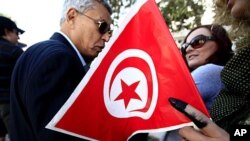Ten months after its revolution triggered a wider popular revolt, Tunisia is the first so-called "Arab Spring" country to hold democratic elections. Tunisia's 4.4-million registered voters are choosing 217 members of the new Constituent Assembly to craft a new Constitution and political system for the North African country emerging from decades of dictatorship.
|
Tunisians are turning out in huge numbers Sunday for the chance to choose among multiple political parties for the first time since independence in 1956. The electoral commission said nearly 70 percent of Tunisia's 4.4-million voters had already cast their ballots several hours before the polls closed. More than 100 parties are fielding candidates in the election. In previous votes, only ruling party candidates were allowed to run. |
Hundreds of people lined up at an elementary school in Bir el Bay, waiting under a hot sun for their chance to vote. Like many here, 45-year old Chadia Hermi is voting for the first time. She has chosen the moderate Islamist Ennahdha party. Hermi said she likes the party and its program. Because it supports Islam and respects religious women like her.
Ennahdha is considered the front-runner in these elections for Tunisia's new Constituent Assembly. But its unclear what percentage of the vote it will get. Especially since more than 100 parties are running.
School teacher Yosra Daggou cast her ballot for the small, centrist Al Majd Party, one of dozens created since Tunisia's January revolution. She said she never bothered to vote under former dictator, Zine el Abidine Ben Ali. "You can see that a lot of people are here today. And they are happy. Because they really, for the first time, they are sure that they will decide and nobody else will decide for them," she said.
Observers are checking polling centers around the country. Election observer Phil Howard is with the U.S. National Democratic Institute, and says he has seen no irregularities. "I think Tunisians know that they they inspired the Arab spring and that in some ways if they pull off the election they well may inspire other countries to run good elections," he said.
76-year-old Salah Garbou says he's voted only three times in his life, once under Ben Ali, once under Tunisia's post-independence President Habib Bourguiba. And now.
Garbou said he hopes Tunisia's next government will work for its people. Many here are hopeful about the country's future. But they are also waiting for the outcome of Sunday's vote.















